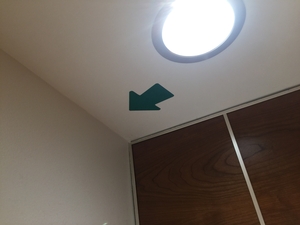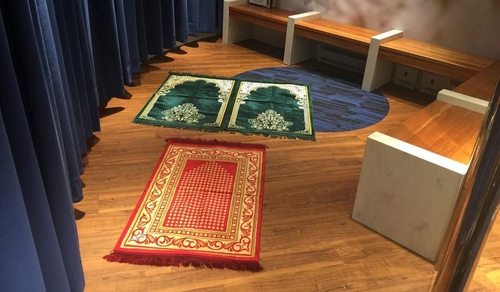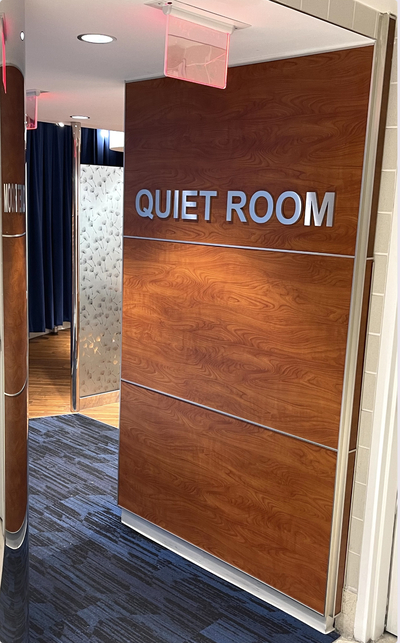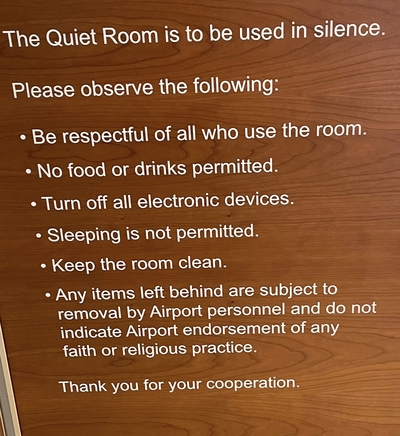Philadelphia International Airport (PHL) opened a heavily promoted "Quiet Room" in August 2018. Accessible 365/24/7, it's an excellent addition to a frenetic travel hub. But it also presents a disquieting problem.
The 315-square-foot space with two chambers is located after security controls, between the D and E terminals. A PHL press release touts the room as "a place of silence which all passengers may use regardless of their worldview, culture and religious affiliation," an area suitable for "those who desire a place for solitude or prayer." What could be wrong with that?
 The Quiet Room's external signage. © Daniel Pipes |
First, the room's name, announced in five languages, presents a problem:
- Quiet Room (English)
- Meditation Room (Spanish)
- Quiet Room (Hebrew)
- Prayer Room (Arabic)
- Quiet Thought (Chinese)
For Arabic readers, ghurfat as-salat, غرفة الصلاة, turns the room from the airport's ostensible "place of silence" into a place of religion for the Arabic name implies a place exclusively for Muslim prayer; no Christian prays in a room called ghurfat as-salat. The sign dog-whistles Arabophones about an Islamic prayer space at PHL.
Second, the room contains many Islamic artifacts, some with official-looking markings (e.g., prayer rugs marked with "PHL Airport").
 The PHL footbath is "provided mainly for Muslim users." © Daniel Pipes |
In addition, Taheri Architects notes that "The Foot Bath directs the passenger to a small prayer corner with an inset carpet in the direction of Qibla" (the direction of Mecca, which Muslims face while praying). Finally, a green arrow on the ceiling points to Mecca.
Fourth, the room is empty, with benches along the wall but lacking chairs or pews, making it mainly suitable for Muslim prayers.
In favoring Islam over other religions, the Quiet Room fits a pattern of U.S. airports. Those in Kansas City and Indianapolis have footbaths. The one in Minneapolis-St. Paul devised an elaborate (but aborted) scheme of differentcolored lights atop taxis to accommodate Muslim drivers unwilling to transport passengers carrying alcohol.
 The PHL qibla, pointing to Mecca. © Daniel Pipes |
In this spirit, I asked PHL to make four modifications to render the Quiet Room genuinely ecumenical:
- Change or eliminate the room's Arabic name.
- Add signage to clarify that religious gifts located in the Quiet Room are strictly private and unofficial.
- Create religious parity, preferably by eliminating the exclusively Islamic amenities (the footbath, inset carpet, and qibla); if not that, then at a minimum by adding non-Islamic amenities (e.g., a Christian cross, Jewish mizrah, Hindu yoga mat, Buddhist prayer bead, etc.).
- Provide chairs in one of the rooms.
After nine months of discussions, airport CEO Rochelle Cameron agreed to #1 (English will be the only language on signs) and #2 (a sign will be added distancing the airport from private gifts). PHL partly agreed to #3 (the qibla has been removed) and partly refused ("we do not accept the premise that the footbath is a religious symbol endorsing one faith over others" and the inset carpet "contains no obvious religious symbol of any kind"). Cameron rejected #4 (no chairs will be added).
I thank PHL for this positive response but ask that it complete the necessary changes. Three remaining features contradict the First Amendment of the U.S. Constitution forbidding the government from the "establishment of religion": the City of Philadelphia must not provide and maintain the footbath and inset carpet, nor keep the Quiet Room devoid of chairs.
PHL's Quiet Room is a small issue but, as this anti-racist moment reminds us, social justice is achieved one small step at a time.
Mr. Pipes (DanielPipes.org, @DanielPipes) is president of the Middle East Forum. © 2020 by Daniel Pipes. All rights reserved.
Aug. 17, 2020 addenda:
(1) Please write airport CEO Rochelle Cameron at Rochelle.Cameron@phl.org with your thoughts on the Quiet Room and please copy me at Daniel.Pipes@gmail.com. This is doubly helpful if you either live in Philadelphia or use PHL.
(2) On visits to the Quiet Room in 2019, I found prayer rugs, Korans, a kufi (male Islamic head covering), and a turba (a tablet Shi'a Muslim use when praying) inscribed with the words "Ya Husayn" on it, a reference to the Islamic prophet's grandson. The Bible and Koran carried stickers, "Donated Holy Book, PHL Airport Quiet Room, Please Do Not Remove." These appeared to be official PHL artifacts; thus my request that the airport clearly signal that they are private donations.
 Prayer rugs in the small Quiet Room at PHL. © Daniel Pipes |
(3) When I first noted the anomalous "Prayer Room" sign in October 2018, I addressed a tweet to the airport, "Now alerted to this discrepancy, will you change the Arabic?"
Note anything odd about this sign that I saw today at the #Philadelphia airport (@PHLAirport)?
En: Quite room
Sp: Meditation room
He: Silent room
Ar: Prayer room
Ch: Meditation roomQuestion to the airport authority: Now alerted to this discrepancy, will you change the #Arabic? pic.twitter.com/63UGuTWQvp
— Daniel Pipes دانيال بايبس (@DanielPipes) October 31, 2018
I received no reply.
(4) A year later, I wrote to Soledad Alfaro, the airport's chief administrative officer, inquiring about the signage, the amenities, and her personal role in these anomalies. Alfaro did not reply. Instead, I heard back from a police detective at the Airport Unit, Michael Wojciechowski. He threateningly informed me in an e-mail that he "read your emails," "visited your website," and that "the airport is questioning your intentions" in asking Alfaro about her role. I responded with "disbelief and outrage" at "this attempt at intimidation." I heard no more from the detective; instead, the airport's director of communications contacted me in a civil and constructive manner, beginning our negotiations. Eventually the airport's legal department took over.
(5) The multifaith prayer room at London's Heathrow Airport seems to suffer from comparable problems: "Rabbi complains after being told to remove shoes in Heathrow multi-faith prayer room."
(6) The footbath is the most worrisome aspect of PHL's Quite Room because it cost money to build and is exclusively for Muslims. On this general problem, see Carol Iannone's 2008 article, "How Muslim footbaths threaten America's social fabric."
Apr. 5, 2022 update: Each time I go to the Philadelphia airport, I check the Quiet Room. Here's the current status on my four requests:
- Change or eliminate the room's Arabic name. Done, through the drastic remedy of eliminating all five non-English languages.

- Add signage to clarify that religious gifts located in the Quiet Room are strictly private and unofficial. Done: "Any items left behind ... do not indicate Airport endorsement of any faith or religious practice."

- Create religious parity, preferably by eliminating the exclusively Islamic amenities (the footbath, inset carpet, and qibla). Partially done: The carpets and qibla are gone, though the footbath remains.
- Provide chairs in one of the rooms. Not done.
